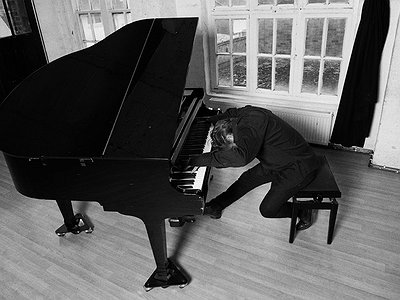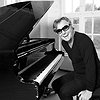Part 2
Could you take us through a day in your life, from a possible morning routine through to your work? Do you have a fixed schedule? How do music and other aspects of your life feed back into each other - do you separate them or instead try to make them blend seamlessly?
I move around a lot, I stay in two different locations so don't stick to a schedule. But remaining flexible means you are open to ideas flying in. A part of me would love to go to a studio five days a week, eight hours a day. Alas that’s not going to happen. Nowadays many people probably do that on their computer ...
I probably get about an hour a day on the piano and a couple on the guitar five days a week, plus lyric ideas are always floating around.
As an example I have been trying to write a song influenced about seeing someone eat a homemade sandwich on a commuter train for about eight years but I can't get it right without making it sound as dull as it appears!
The world right now seems to reward hard work whereas I try to rely on inspiration so the rewards come in the work itself.
Could you describe your creative process on the basis of a piece or album that's particularly dear to you, please? Where did the ideas come from, how were they transformed in your mind, what did you start with and how do you refine these beginnings into the finished work of art?
I sit at the piano or with the guitar and hope something interesting comes out. It generally does very quickly then the problem comes with developing the original inspiration. That’s the ‘rolling your sleeves up’ workman like part of the process. That takes time.
A record I made about fourteen years ago (‘The Last Second of Normal Time’) was made with a great musician friend (who now is a renowned TV editor) We had worked together for a long time and he started building up a home studio so I would go around his place every spare minute he had. There was no demand for what we were doing. So it really was finished when WE thought it was right. The record company [The Creeping Bent Organisation] picked the tracks which is the first time I have let that happen as I was so pleased with all the tracks available!
There are many descriptions of the ideal state of mind for being creative. What is it like for you? What supports this ideal state of mind and what are distractions? Are there strategies to enter into this state more easily?
I tend to write in all states of mind and the music generally reflects that state of mind. There are far too many distractions like having to find, book and wait for real workmen to come and fix the things that I can’t fix which is (almost) everything. But generally having no pressing demands (like filling in your tax form etc) tends to help open up a space where the ideas can come in.
How is playing live and writing music in the studio connected? What do you achieve and draw from each experience personally? How do you see the relationship between improvisation and composition in this regard?
I think it’s amazing that musicians both have to perform and write for the studio. I love both environments. Being able to do both is good for confidence and conviction.
All my compositions drift in and out of improvisation until I hit on a solid form. But I always leave room for new ideas to float in.
How do you see the relationship between the 'sound' aspects of music and the 'composition' aspects? How do you work with sound and timbre to meet certain production ideas and in which way can certain sounds already take on compositional qualities?
Timbre is massive for me. Since I started I’ve often introduced ‘colours’ (with things like found sound) that would not normally go with the mood of the composition. If it works in my head then I will go ahead and use it. Saying that they should become an important part of the composition not a novelty.
Our sense of hearing shares intriguing connections to other senses. From your experience, what are some of the most inspiring overlaps between different senses - and what do they tell us about the way our senses work? What happens to sound at its outermost borders?
I once heard a tornado in central London that was the strangest sound I’ve ever heard. It’s been in my head to try to recreate that.
It's certain atmospheres that I have experienced that I try to reproduce in my music. These can be both geographical atmospheres and emotional / spiritual experiences.
I feel the senses definitely overlap. Proust wrote both the sound of a piece of music or the taste of a certain biscuit took him back to a particular place and time. That’s where it’s at!
Art can be a purpose in its own right, but it can also directly feed back into everyday life, take on a social and political role and lead to more engagement. Can you describe your approach to art and being an artist?
I have the ‘skin too thin’ gene so most things can knock me all over the place. I have to just reflect what I see and how I see it but I have no interest in demanding others see it my way.
It is remarkable, in a way that we have arrived in the 21st century with the basic concept of music still intact. Do you have a vision of music, an idea of what music could be beyond its current form?
MUSIC always bends itself into different forms and new generations bend them, with the appropriate tools of their time. Let’s hope we keep accumulating tools that reproduce the sound of the souls yearning, in all directions …






